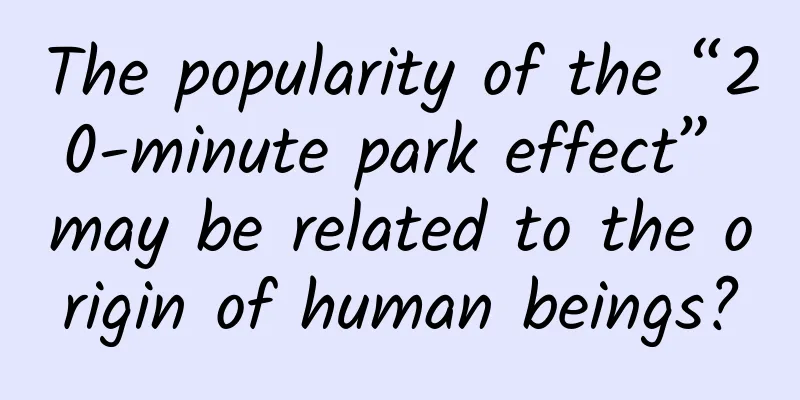The popularity of the “20-minute park effect” may be related to the origin of human beings?

|
Have you heard of the "20-minute park effect"? "On a sunny spring day, spend 20 minutes in the park and absorb the nutrients given by nature. Even without doing exercise, you can feel better." Recently, this low-cost way to relieve stress has been highly praised by many netizens. They have shared their 20-minute park experience on social platforms, saying that it is "really useful", "powerful healing power" and "amazing effect"... ▲“Grass-planting posts” on social software Fantastic park 20 minutes What exactly is the "20-minute park effect"? Does it really have the "miraculous effect" that netizens say it has? It all started with an article published in Frontiers in Psychology. In this article, the first author of the article, Dr. Marycolo Hunter, assistant professor of biostatistics at the University of Michigan, pointed out that people's contact with nature can help relieve stress, and the effect is most significant after 20 to 30 minutes. This is the origin of the "20-minute park effect". ▲Article content In order to prove the scientificity and effectiveness of this theory, Hunter and his colleagues also designed relevant experiments. In the experiment, 36 participants were asked to go outdoors at least three times a week for 8 weeks, staying in parks and other places for 10 minutes or more. Afterwards, the researchers collected saliva samples from them before and after contact with nature every two weeks to measure their stress hormone levels. So what do levels of stress hormones in the body mean, and why do scientists measure them? In fact, the body's stress hormones are produced to maintain the body's balance. For example, when fear, trauma or severe physical movement occurs, the body will release these substances to keep the body stable. When stress hormones are at a high level, they can damage brain cells, and long-term accumulation can easily lead to symptoms such as premature aging and brain atrophy. When this stress hormone is excessive, it can have negative effects on the human body, such as causing obesity and weakening the immune system. In severe cases, it can disrupt the function of the inner wall of blood vessels, cause the accumulation of plaques in the arteries, and increase the risk of heart disease and stroke. Therefore, it is also called the "death hormone." ▲Stress hormones in the human brain So, can the “20-minute park effect” really reduce people’s stress hormone levels? The conclusion surprised Hunter and his colleagues. The data showed that just 20 minutes of nature experience was enough to significantly reduce subjects' stress hormone levels. But if people could spend a little more time immersed in it, such as sitting or walking for 20 to 30 minutes, stress hormone levels would drop at the highest rate. After that, the additional stress-reducing benefits would continue to increase, but at a slower rate. "This study provides new insights into how nature experiences affect people's stress levels in everyday life and breaks new ground by addressing some of the complexities of measuring effective nature doses," said Hunter. Or is it related to human origins? In fact, before the "20-minute park effect" was proposed, many studies have confirmed the many benefits of being in a forest environment to the human body. David Strayer, a cognitive psychologist at the University of Utah, once proposed a theory called the "three-day effect." He believes that in daily life, the human brain needs to deal with various situations and information, which can easily lead to fatigue over time. At this time, if one can slow down the pace, stop trivial matters, and be in a natural environment that heals the heart, it can not only restore vitality, but also enhance brain power and reaction speed. To test this theory, he conducted an experiment on a group of wilderness survival trainers who participated in Strayer's experiment and proved that after a three-day backpacking trip in the wilderness, the creativity of these people increased by 50%. In addition, the University of Exeter in the UK has analyzed the mental health data of 10,000 urban residents and tracked where they lived in the past 18 years. The study found that residents who live near more green spaces are less likely to have mental illness problems. In Finland, where rates of depression, alcohol abuse and suicide are high, encouraging people to experience nature more is part of the government's public health policy. Under this policy, researchers interviewed thousands of people and asked them to rate their mood and stress levels after visiting nature and urban areas, in order to encourage people to get out of the house more often and get closer to nature. ▲Nature that heals the heart So, what is the main principle behind humans being able to reduce physical and mental stress by being close to nature? It all starts with human evolution. Researchers believe that the reason why natural environments can reduce stress and relax the body is because humans evolved in natural environments. Therefore, compared with vehicles and high-rise buildings, human senses are more adapted to the smell and visual information of plants and streams. In other words, humans have a natural intimacy with nature since the day they were born. Therefore, whether from the perspective of human evolution or the perspective of human physical and mental development, going outside, going to the park, and taking a break in nature is a choice and attempt that has great benefits for physical and mental health. From ancient times to the present, this "nature pill" has been a good prescription for healing our body and mind. |
>>: Illustration +1! What does the hairiest beetle in the world look like? | Expo Daily
Recommend
WOT lecturer Tingyun Technology Vice President Liao Xiongjie: APM adds wings to cloud applications
In the PC era, APM was widely used for website mo...
The purchase price was 5 yuan and the selling price was 30 yuan. More than 100 were sold in one day! Recommendation of summer blue ocean side job, selfless sharing!
It's only two months until summer, and the we...
Here’s what adults should know about school bullying!
School bullying is defined as an incident in whic...
Does it matter who is number one in the Chinese mobile phone market?
On the same day, as major domestic and foreign ma...
A little saliva can test whether a child is a genius? Is the genetic test of the Internet celebrity really reliable?
In recent years, genetic testing has become comme...
GitLab acquires GitHost, making cloud management more convenient
[[132946]] On April 26, GitLab acquired GitHost. ...
Songyuan SEO training: How to distinguish between SEO and Baidu promotion? Which one is suitable for you?
With the development of Internet technology, comp...
Crab Friends Club "Tik Tok Traffic Drainage-Interception Tutorial" Super Simple Drainage Method
Training course video content introduction: The D...
Sohu account, Baijia account, which platform is the most suitable for self-media people?
Self-media has become a common model for personal...
How to promote a website? Detailed explanation of website promotion!
Promotion goals Compared with the complete Intern...
Complete list of product promotion channels in 2019!
Many advertisers will ask what channels are avail...
How does Tik Tok create a hit? Tik Tok hot marketing skills!
Why can a dancing video of others get tens of mil...
What is the future of television? Vertical resources will become the fulcrum for opening up the industry
The rise of mobile Internet has brought new devel...
How to build a complete growth model?
Today we will talk about three aspects: what is a...







![[Grain Policy of a Great Country] Exploring Smart Agriculture - Smart Ranch](/upload/images/67f1c96a5cb71.webp)

